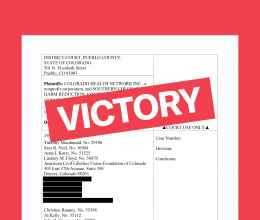FOR IMMEDIATE RELEASE
November 20, 1998
In response to a request from the American Civil Liberties Union of Colorado (ACLU), the Denver Public Safety Review Commission announced last evening that it will investigate whether Denver police routinely permit patrol officers to conduct unconstitutional detentions and searches of innocent citizens.
The Commission, a civilian panel that reviews allegations of police misconduct, will also consider the ACLU's recommendation that patrol officers be required to document the facts they rely on when conducting pat-down frisks or temporary detentions of pedestrians and motorists.
The Commission's action came in response to a detailed letter sent by ACLU Legal Director Mark Silverstein, who also addressed the Commission at last night's public meeting. In the letter, dated November 16, the ACLU identified what it characterized as "severe and widespread deficiencies in the training of Denver police officers" with regard to the constitutional limits of police power to conduct temporary detentions and frisks.
The ACLU asserted that the Denver Police Department ignores settled constitutional law by permitting police officers to conduct temporary detentions and pat-down searches of innocent citizens as a "matter of discretion." The ACLU's letter quotes a high-ranking spokesperson for the Department as stating that he could justify a pat-down frisk of any individual he wants to talk to on the 16th Street Mall in downtown Denver.
The letter also charges that patrol officers are not required to keep any records of the reasons for stopping innocent motorists or for detaining and frisking innocent civilians, thereby insulating this police activity from any effective review by supervisory officers.
According to the ACLU, the policies of the Denver Police Department permit patrol officers to conduct themselves as though there were an unwritten law that makes it a crime to "Drive While Black" or to "Drive While Hispanic," a practice that has received nation-wide attention and has prompted calls for police departments to keep records and statistics of all traffic stops even when they do not result in a ticket.
In response to the ACLU's request, the Commission also agreed to reconsider its decision in the case of Mark Schneider, who complained that a Denver police officer conducted an unjustified pat-down frisk on a downtown sidewalk on December 15, 1997. The frisk took place while Schneider was peacefully participating, along with two companions who were not frisked, in a vigil for Middle East peace. In the hope of reaching a wider audience, the group had been conducting its twice-a-week vigils near the federal courthouse, where media
representatives were gathered to cover the trial of Terry Nichols, who was charged with responsibility for bombing the federal building in Oklahoma City in 1995.
After investigating Schneider's complaint, the Denver Police Department determined that the officer's conduct was justified as a "cursory search for weapons," but it did not identify any facts that suggested that Mr. Schneider might have been armed. The Commission upheld the police in its initial review of Schneider's appeal, which prompted the ACLU's written request to reconsider.
In the letter, ACLU Legal Director Mark Silverstein recounted his efforts to advocate on behalf of Mr. Schneider while his complaint was pending with the Denver Police Department. Those efforts resulted in conversations with Captain John Lamb, a high-ranking supervisor who had reviewed the file. According to the letter, Captain Lamb acknowledged that there was nothing remarkable about Mr. Schneider's conduct other than the fact that he was near the federal courthouse and engaged in a protest while a high-profile trial was taking place. According to the letter, Captain Lamb stated that the decision to frisk depends on an individual officer's "mind-set" and personal style of policing and is justified as "a matter of discretion."
Silverstein accused the Denver Police Department of ignoring constitutional standards, which forbid pat-down searches unless an officer has objective and reasonable grounds to suspect that an individual is armed.
"While Denver police officers were understandably in a state of heightened alert," Silverstein told the Commission, "the bombing trial did not suspend the Constitution. Nor did it suspend the Fourth Amendment's requirement of particularized and individualized suspicion. The Denver Police Department has failed to provide any objective facts that provide a reasonable basis to suspect that Mr. Schneider was carrying a weapon."
The Commission is expected to reconsider Mr. Schneider's complaint at its next monthly meeting in December. Its review of the Department's policies will require additional time.

